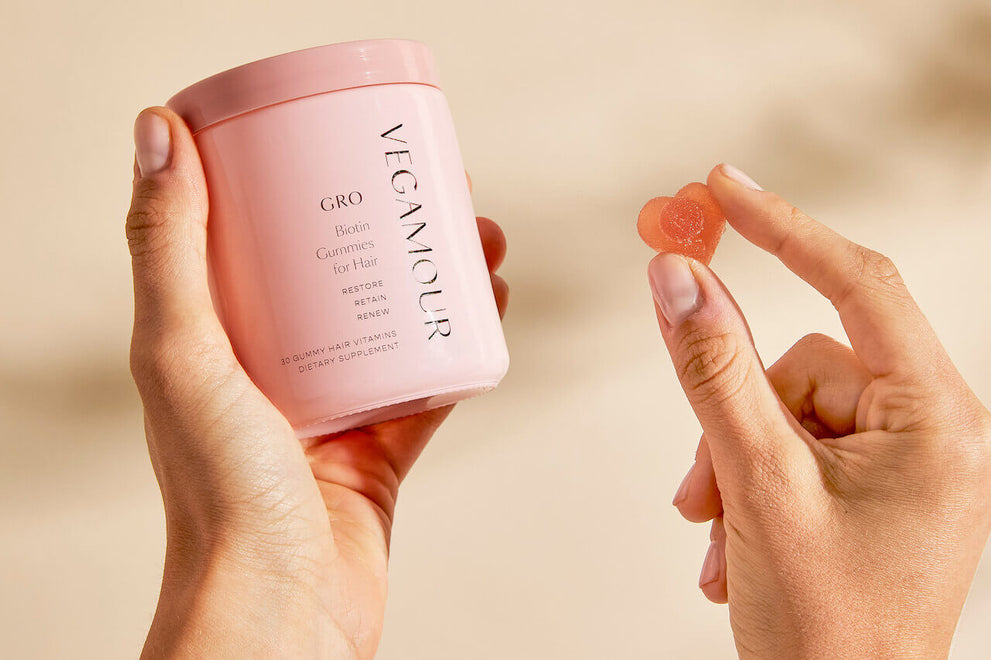We've all seen influencers in our feeds who attribute their gorgeous, glossy locks and clear, plump skin to their daily supplement routine. Of course, dietary supplements can help boost the body, and biotin supplements, in particular, are often used to boost the skin, hair and nails.
But what happens when a biotin deficiency hits and boosting the B-7 in your system becomes a necessary part of your day? How can you keep your body functioning at a peak level? If you're curious about what a biotin deficiency might look like, keep reading to discover details on the deficit and what you can do to help. Plus, discover the supplements that will help your mane thrive.
What Is Biotin?
B7, or the vitamin biotin, is an essential water-soluble nutrient that helps metabolize fats, carbs and dietary protein in our daily food consumption. Biotin's function is important, in part, because protein is essential to repair the body and maintain cell health, but the body can't produce it naturally.
Biotin is part of the vitamin B complex, a group of nutrients essential for healthy digestive, nerve, metabolic and cardiovascular function. "Biotin is also involved in cell proliferation, DNA repair and normal immune function," said board-certified dermatologist Dr. Anna Chacon. "Moreover, biotin is also known to promote skin health and plays a role in the production of keratin for strong hair and nails."
Shop: Biotin Supplements for Thicker, Fuller Looking Hair
What Is a Biotin Deficiency?
When your body can't get enough biotin, you can suffer from a biotin deficiency.
Decreased biotin levels and a biotin deficiency can occur for several reasons. "Biotin deficiency is a nutritional disorder which can become serious if left to progress untreated," said Chacon. However, the doctor pointed out that a biotin deficiency is not as common as other vitamin deficiencies.
Eating a healthy, balanced diet means you will be less likely to struggle with biotin depletion. Many foods contain high-dose biotin, which ensures the body maintains a healthy biotin status.
To avoid a possible biotin deficiency, here are some of the foods to incorporate into your diet:
- Almonds
- Sunflower seeds
- Avocados
- Broccoli
- Bananas
- Mushrooms
Related: 9 Biotin-Rich Vegan Foods to Eat for Healthy Hair
What Causes a Biotin Deficiency?
"Biotin deficiency can occur as a result of certain medications, intestinal disorders, long-term dieting, biotinidase deficiency and other genetic causes," said Chacon.
Here's more information about the causes of biotin deficiency.
Biotinidase deficiency (BTD)
A biotinidase deficiency is a rare inherited metabolic disease in which the body cannot recycle biotin, leading to a biotin deficiency. With a biotinidase deficiency, the BTD gene cannot extract biotin from food, leading to biotin deprivation. Enzymes require free biotin to break down fats, proteins and carbohydrates. With BTD, the enzymes are impaired.
A biotinidase deficiency or a partial biotinidase deficiency is estimated to impact around one in 60,000 newborn babies. Babies that struggle with biotin metabolism exhibit symptoms within the first few weeks of life. A profound biotinidase deficiency can trigger seizures, weaker muscle tone, hair loss, hearing problems and more. Prenatal testing can investigate a biotin deficiency in the unborn child.
Pregnancy
An unborn child is dependent on the mother for essential nutrients, including biotin, to help it develop properly. One-third of pregnant women struggle with biotin absorption and develop a biotin deficiency. Blood tests during pregnancy are effective for determining biotin status and serum biotin levels and can help decide whether oral biotin supplements are necessary.
Certain medications
Antibiotics can help you heal after a bacterial infection, but unfortunately, they can also leave you with an impaired immune system function. They can destroy the healthy bacteria in your gut and inhibit biotin transport, leading to inflammatory bowel disease and marginal biotin deficiency. Chacon said, "Long-term antibiotic use can interfere with the production of biotin by the gastrointestinal tract." You'll likely need supplemental biotin if you take antibiotics for a long time.
Shop: Juli Bauer Roth's Top VEGAMOUR Picks
Smoking
According to researchers, smoking interferes with biotin metabolism and can lead to a biotin deficiency. Biotin treatment and supplementation might help the body get back on track once the smoker has quit. Smoking causes havoc across the body, so it's best to give up sooner rather than later.
IV feeding
If you're fed by an IV tube, your biotin absorption may lower. Without biotin supplementation, you might be at risk of developing biotin deficiency.
Prolonged dieting
Restricted eating over a long period may result in the body not getting the nutrients it needs. To avoid a biotin deficiency, maintain a balanced diet rich in minerals and vitamins. Who Does a Biotin Deficiency Typically Affect?
"People with health problems or conditions that affect the body's nutrient absorption and those who are taking certain medications can be at risk of developing biotin deficiency," said Chacon. "Medications related to biotin deficiency include certain anticonvulsants such as phenobarbital, phenytoin, carbamazepine and primidone. So, patients who are taking these medications can be at risk. Long-term antibiotic use can also interfere with the production of biotin by the gastrointestinal tract."
Symptoms of Biotin Deficiency
"The common symptoms of biotin deficiency include thinning hair, hair loss and even loss of hair color," explained Chacon. "Skin rash is also very common, and they are often found to be seborrheic and eczematous. Aside from physically observed symptoms, patients with biotin deficiency can also experience symptoms of depression, lethargy, hallucinations and even paresthesia of extremities or the feeling of pins and needles. Biotin deficiency often affects the skin and other skin appendages, such as the hair and nails."
It can be tricky to diagnose a biotin deficiency without formal tests, but some symptoms can include:
- Red rashes on the skin
- Dry eyes
- Hair loss
- Fatigue
- Very dry or scaly skin
- Nausea
- Insomnia
- Depression
- Muscle pain
- Depression
Hair Challenges Someone With a Biotin Deficiency Might Face
If someone is struggling with a biotin deficiency, they might experience hair loss and shedding. Many believe biotin supports healthy hair growth because it's involved in the production of keratin.
Oral biotin supplementation is super accessible, and GRO Biotin Gummiescan help with biotin administration across the body. These naturally flavored strawberry gummies feature a combination of vitamins and minerals, including vitamins B-5, 6 and 12, to support the body's natural production of keratin and collagen too. In addition, vitamins A, C and E work together to neutralize follicle damage, and zinc helps maintain a healthy scalp. Taking just one gummy a day can keep hair looking and feeling gloriously healthy.
Related: 3 Ways a Daily Biotin Supplement Can Benefit Your Hair, Skin and Nails
The Bottom Line
Whether you're pregnant, moving away from a restrictive diet or struggling with something more serious, keeping tabs on your biotin levels can keep your body functioning well and your hair looking great.
Changes in the health of your hair often indicate a medical issue long before other, more troubling symptoms arise. Chacon concluded, "Biotin deficiency is rare, but it can truly affect some people. You must eat a healthy and well-balanced diet to obtain the nutrients your body needs."
To maintain your overall hair wellness, always check in with a medical professional if you're concerned, and combine a healthy lifestyle with supplementation.
#include-related-slider#
More From VEGAMOUR
- Shop: The Best Vegan Hair Vitamins
- 11 Things Beauty Editors Are Saying About VEGAMOUR
- Why Does My Hair Feel Thinner? 8 Possible Reasons




















